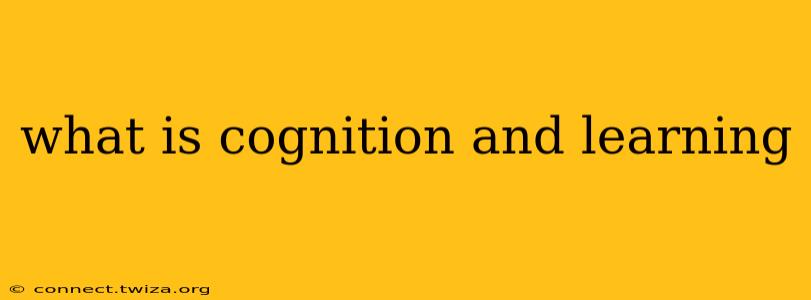What is Cognition and Learning? A Deep Dive into the Mind's Processes
Cognition and learning are intricately linked processes that shape our understanding of the world and our ability to navigate it. While distinct, they are inseparable aspects of human experience, constantly influencing and informing each other. This exploration delves into the nature of each, highlighting their relationship and significance.
What is Cognition?
Cognition encompasses all the mental processes involved in acquiring, processing, storing, and using information. It's the intricate machinery of the mind, responsible for everything from basic perception to complex problem-solving. This includes:
- Perception: How we interpret sensory information from the world around us. This involves not just seeing, hearing, touching, tasting, and smelling, but also making sense of those sensations.
- Attention: The selective focusing of our conscious awareness on particular stimuli. Our ability to filter out distractions and concentrate is crucial for effective cognition.
- Memory: The encoding, storage, and retrieval of information. This spans various types, including sensory memory, short-term memory, and long-term memory, each playing a vital role in cognitive function.
- Language: Our system for communicating using symbols and rules. Language allows us to share complex ideas, learn from others, and build social connections.
- Thinking & Problem-Solving: The processes involved in manipulating information to make decisions, form judgments, and solve problems. This can range from simple arithmetic to complex strategic planning.
- Decision-Making: The process of selecting a course of action from among several alternatives. This involves weighing potential outcomes, considering risks, and evaluating available information.
What is Learning?
Learning is the process of acquiring new knowledge, skills, behaviors, or values through experience, study, or being taught. It's a dynamic process that involves changes in our cognitive structures and abilities. Learning can be:
- Explicit: Conscious and intentional, such as studying for an exam or learning a new language through formal instruction.
- Implicit: Unconscious and unintentional, such as learning to ride a bike or developing a fear of dogs through experience.
- Associative: Learning by connecting two or more stimuli, as in classical conditioning (Pavlov's dogs).
- Non-Associative: Learning that involves changes in response to a single stimulus, such as habituation (getting used to a noise).
How are Cognition and Learning Related?
Cognition provides the tools for learning, while learning shapes and modifies our cognitive abilities. Learning wouldn't be possible without the cognitive processes that allow us to perceive, remember, and process information. Conversely, our cognitive abilities are constantly refined and enhanced through learning experiences. It's a cyclical relationship, with each process continuously influencing the other.
What are the different types of cognition?
While the definition of cognition is broad, several key areas are studied:
- Social Cognition: This explores how we understand and interact with others, encompassing aspects like empathy, theory of mind (understanding others' mental states), and social reasoning.
- Emotional Cognition: This examines the interplay between emotions and cognitive processes, considering how emotions influence our thoughts and decisions.
- Cognitive Development: This field investigates the changes in cognitive abilities across the lifespan, from infancy to old age.
How does learning affect cognition?
Learning directly impacts various cognitive functions:
- Improved Memory: Learning strengthens neural pathways, enhancing our ability to encode, store, and retrieve information.
- Enhanced Problem-Solving Skills: Learning provides us with new strategies and approaches to tackle challenges.
- Increased Attention Span: Engaging in challenging learning experiences can improve our ability to focus and concentrate.
- Expanded Knowledge Base: Learning builds a foundation of knowledge upon which we can build further understanding.
What are some examples of cognition and learning in everyday life?
- Learning a new recipe: This involves perception (reading the instructions), memory (remembering the steps), and problem-solving (adjusting quantities based on ingredients available).
- Navigating a new city: This requires perception (interpreting maps and signs), spatial cognition (understanding distances and directions), and memory (remembering landmarks).
- Having a conversation: This relies on language processing, understanding social cues, and making inferences about the other person's intentions.
In conclusion, cognition and learning are fundamental aspects of human experience. Understanding their intricate interplay is crucial for comprehending how we acquire knowledge, solve problems, and interact with the world. Further research into these areas continues to reveal the remarkable complexity and adaptability of the human mind.
